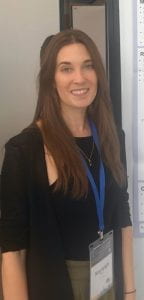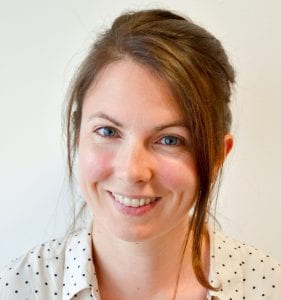Gemma Sharp

I’m a Senior Lecturer in Molecular Epidemiology, with a long-standing interest in reproductive biology and women’s health. Most of my previous research has been focused around pregnancy, for example my PhD was on pregnancy complications and the molecular pathways behind childbirth. More recently, I have begun a series of research projects looking at the epidemiology of menstrual function and dysfunction and the impact of menstruation on women’s broader health and quality of life. As with many areas of women’s health, understanding in this area is severely limited, and considering the huge number of people affected, the area is under-researched. I’m very much looking forward to trying to rectify this by working with the multidisciplinary GW4 Menstrual and Mental Health Research Community.
Twitter: @ammegandchips
Abigail Fraser

I am a Professor of Epidemiology with an interest in women’s reproductive health. Reproductive health is an important health domain in its own right. It is also a useful marker of women’s overall health and well-being, providing opportunities to identify women at increased risk of ill-health and to intervene to reduce this risk. I look forward to working with a diverse and multidisciplinary group of researchers to improve young women’s reproductive and mental health.
Twitter: @abifraser1
Gemma Sawyer

I am currently a Master student at the University of Bristol studying Public Health and am set to begin a PhD examining the relationship between menstrual symptoms and socioeconomic disadvantage later on this year. I am interested in menstrual health and its relation to mental health as they are both complex and important issues that affect a great number of people and are relatively under-researched. I am excited to be a part of this community early in my academic career to learn from its work and members.
Kayleigh Easey

I am a postdoc within the MRC IEU at the University of Bristol. My research focuses on reproduction and the potential causal effects of parental prenatal health behaviours on offspring health. I have a background working in mental health both in research and applied settings, and am interested in finding and reducing pathways to such harm. Menstrual health can have a huge impact on many areas of life, yet there is a lack of funded research investigating this. I am particularly interested in bringing awareness to this area and establishing pathways from menstrual disorders to mental health, to ultimately develop better support and treatment options for women.
- Twitter: @KayEasey
Kate Bowen-Viner

Kate is a Social Policy PhD student at the University of Bristol. Her PhD focuses on Relationships Education, Relationships and Sex Education and Health Education in England and how education can help to tackle menstrual stigma. Kate has a career background in education. She has been a secondary school teacher, a civil servant (Department for Education) and a senior associate at the Centre for Education and Youth (CfEY). Kate’s experience of working in the education sector has contributed to her interest in the intersection between young people’s experience of menstruation, their mental health and wellbeing and stigmatising menstruation discourses. She is particularly interested in working with young people to tackle the context-specific menstrual stigma that they experience in their lives.
- Twitter: @KateBV
Lindsey Pike

I work to support research-policy engagement and impact. I’m interested in how we can ensure that policy and practice decisions are informed by the best available evidence, and take account of issues related to equality and diversity. The Department for Health & Social Care’s Women’s Health Strategy provides a timely opportunity to highlight and focus on gendered issues such as menstruation and mental health, and I’m looking forward to thinking the implications of this work through with the team.
- Twitter: @Lindsey_Pike
Tigist Grieve

I am a Lecturer and researcher at the University of Bristol. My background is in International Development. My research interest encompasses inequalities and questions of social reproduction with particular interest on adolescent girls’ SRHR, welfare and wellbeing in Africa. My recentresearch work includes Burkina Faso, Ethiopia, Sierra Leone, Somalia, and Uganda. A recent project where I was a PI can be found here Unheard voices of girls in Africa. Ienjoy bringing my research and practical insights into teaching to enrich students experience and exposure to relevant real-world issues. As a pracademic I am also incredibly well positioned in seeing research uptake by NGOs in informing appropriate interventions.
I am particularly interested in an interdisciplinary approach to adolescent girls wellbeing and SRHR.
In academic setting, I am the co-lead of the Faculty of Social Sciences and Law International Development Research Group- FSSL-ID. I am also a board member at the Bristol Poverty Institute – BPI and a Visiting Fellow of Centre for Development Studies (CDS) at the University of Bath.
Beyond academia I engage in informing policy and practice with valuable evidence to disrupt inequality and intergenerational transfer of social and economic disadvantages. I am a Trustee of Bristol based Charities, the Southwest International Development Network (SWIDN). I am also the founder of a small charity, For-ethiopia www.for-ethiopia.com and the Mullers Charitable Foundation, based in Bristol.
Twitter @TigistGrieve
Rebecca Richmond

I am a Vice Chancellor’s Research Fellow in Molecular Epidemiology. My major areas of focus are on the large-scale integration of molecular data in population-based and clinical health science as well as the development and application of causal inference methods, including Mendelian randomization. I have specific interests in cancer and sleep research. I would like to explore in greater depth the links between reproductive and menstrual conditions and cancer development, as well as the interplay between sleep and women’s health.
Gemma Ford

I am a lecturer and the programme lead for the taught MSc in Reproduction and Development in the Bristol Medical School: https://www.bristol.ac.uk/medical-school/study/postgraduate/reproduction-development/ I was awarded a Needham Cooper CASE Scholarship which enabled me to study for a PhD in Neuroendocrinology at Bristol and GlaxoSmithKline, looking at the effects of stress and metabolism on hypothalamic neuropeptides. I then moved to Galway, Ireland for my postdoctoral research, maintaining my interest in stress and neuroendocrinology, but also extending my interests into pain medicine and affective disorders. My current teaching and research interests are in the area of reproductive endocrinology, and my research focuses on understanding the mechanisms underpinning the reciprocal relationship between stress and anxiety, nutrition, reproduction and pain.
Maria Fannin

I am a feminist health geographer with an interest in reproductive politics. Most of my research in this area has focused on changing understandings of pregnancy and childbirth over time and the different forms of expertise and knowledge shaping how these processes are experienced. For the last decade, I have carried out qualitative research on tissue donation and use (especially reproductive tissues such as umbilical cord blood, placenta, and menstrual blood but also peripheral blood). I am particularly interested in how research on mental and menstrual health can play a role in transforming medical and cultural norms about women’s bodies and the bodies of people who menstruate.
Other members
Laura Howe, Sarah Sullivan, Deborah Lawlor, Carol Joinson, Sinead English, Doretta Caramaschi, Hannah Jones
